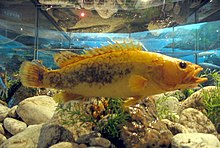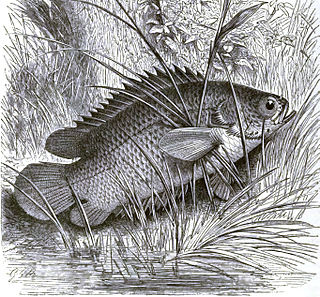
The Anabantidae are a family of ray-finned fish within the order Anabantiformes commonly called the climbing gouramies or climbing perches. The family includes about 34 species. As labyrinth fishes, they possess a labyrinth organ, a structure in the fish's head which allows it to breathe atmospheric oxygen. Fish of this family are commonly seen gulping at air at the surface of the water. The air is held in a structure called the suprabranchial chamber, where oxygen diffuses into the bloodstream via the respiratory epithelium covering the labyrinth organ. This therefore allows the fish to move small distances across land.

The members of the family Percichthyidae are known as the temperate perches. They belong to the order Perciformes, the perch-like fishes.

The goatfishes are fish of the family Mullidae, the only family in the order Mulliformes. The family is also sometimes referred to as the red mullets, which also refers more narrowly to the genus Mullus.

Cirrhitidae, the hawkfishes, are a family of marine ray-finned fishes found in tropical seas and which are associated with coral reefs.
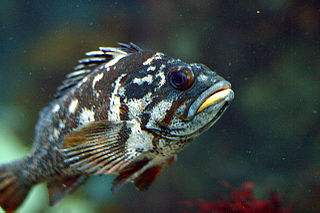
Sebastinae is a subfamily of marine fish belonging to the family Scorpaenidae in the order Scorpaeniformes. Their common names include rockfishes, rock perches, ocean perches, sea perches, thornyheads, scorpionfishes, sea ruffes and rockcods. Despite the latter name, they are not closely related to the cods in the genus Gadus, nor the rock cod, Lotella rhacina.

Siniperca chuatsi, the mandarin fish, is a species of freshwater ray-finned fish from the family Sinipercidae, the Oriental perches. It is the type species of the genus Siniperca.

Protopterus is the genus of four species of lungfish found in Africa. Protopterus is considered the sole genus in the family Protopteridae, which is grouped with Lepidosiren in the order Lepidosireniformes.

The Moronidae is a family of percomorph fishes, commonly called the temperate basses, in the order Moroniformes. These fishes are found in the freshwaters of North America and the coastal waters of the North Atlantic.

Sander is a genus of predatory ray-finned fish in the family Percidae, which also includes the perches, ruffes, and darters. They are also known as "pike-perch" because of their resemblance to fish in the unrelated Esocidae (pike) family. They are the only genus in the monotypic tribe Luciopercini, which is one of two tribes in the subfamily Luciopercinae.
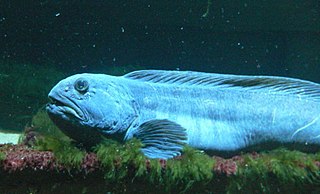
Anarhichadidae, the wolffishes, sea wolves or wolf eels, is a family of marine ray finned fishes belonging to the order Perciformes. These are predatory, eel shaped fishes which are native to the cold waters of the Arctic, North Pacific and North Atlantic Oceans.
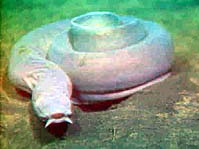
The Pacific hagfish is a species of hagfish. It lives in the mesopelagic to abyssal Pacific Ocean, near the ocean floor. It is a jawless fish and has a body plan that resembles early Paleozoic fishes. They can excrete copious amounts of slime in self-defense.

Gymnocephalus is a genus of ray-finned fishes from the family Percidae, which includes the perches, pike-perches and darters. They are from the Western Palearctic area, although one species, Gymnocephalus cernua has been accidentally introduced to the Great Lakes region where it is regarded as an invasive species. They have the common name "ruffe" and resemble the true perches in the genus Perca, but are usually smaller and have a different pattern.

Lutjanidae or snappers are a family of perciform fish, mainly marine, but with some members inhabiting estuaries, feeding in fresh water. The family includes about 113 species. Some are important food fish. One of the best known is the red snapper.

Tetraroginae is a subfamily of marine ray-finned fishes, commonly known as waspfishes or sailback scorpionfishes, belonging to the family Scorpaenidae, the scorpionfishes and their relatives. These fishes are native to the Indian Ocean and the West Pacific. As their name suggests, waspfishes are often venomous; having poison glands on their spines. They are bottom-dwelling fish, living at depths to 300 metres (980 ft). These creatures usually live in hiding places on the sea bottom.

Myxine glutinosa, also known as the Atlantic hagfish, is a type of jawless fish belonging to the class Myxini..

Neosebastidae, the gurnard scorpionfishes or gurnard perches, is a small family of deep-sea ray-finned fishes. It is part of the suborder Scorpaenoidei within the order Perciformes. These fishes are found in the Indian and Pacific oceans. Several of the species in this family are venomous.

Kyphosus is a genus of sea chubs native to the Atlantic, Indian and Pacific oceans. It is the only genus in the subfamily Kyphosinae of the family Kyphosidae.

Myllokunmingiidae is a group of very early, jawless prehistoric fish (Agnathans) which lived during the Cambrian period. The Myllokunmingiids are the earliest known group of craniates. The group contains only three known genera, Haikouichthys, Myllokunmingia, and Zhongjianichthys. Their fossils have been found only in the Maotianshan Shales lagerstätte.

Lampetra ayresii is a species of lamprey in the family Petromyzontidae. It is also called the river lamprey or western river lamprey. It is found in the eastern Pacific, specifically from Tee Harbor, Juneau in Alaska to the Sacramento–San Joaquin drainage in California, USA. It can survive in both marine surface waters and freshwater lakes, rivers, and creeks. In freshwater, it is found typically in the lower portions of large river systems. It is a predatory fish and feeds on fishes in the size range of 10–30 cm. It feeds by attaching to prey using its round, sucker-like mouth. Adult western river lampreys typically grow to about 21 cm (8.3 in) total length (TL), but can reach 31 cm (12 in) TL.
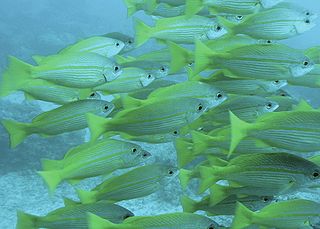
Lutjaninae is a subfamily of marine ray-finned fishes, one of four subfamilies classified within the family Lutjanidae, the snappers.
